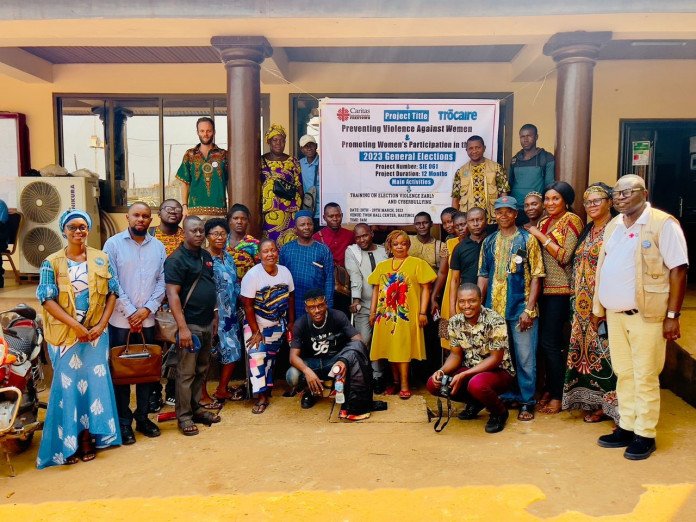By Millicent Senava Mannah
Caritas Freetown’s Justice and Peace Commission, with support from Trocaire, has held a stakeholders’ engagement and closeout session on their “Preventing Violence Against Women and Promoting Women and People With Disabilities Participation in the 2023 General Elections” Project which benefited over 1,210 beneficiaries. This event was held on Friday 26th January 2024 at the Western Area Rural Council Hall, in Waterloo, Western Rural District.
It must be noted that the Commission, with funds provided by Trocaire, has implemented the one-year project (February 2023 to January 2024)in fifteen communities in the Western Area (during the pre and post electioneering processes); five in the Western Urban (Susan’s Bay, Culvert, Portee, Wellington Old Wharf & Calaba Town) and ten in the Western Area Rural (Mongegba, Rogbangba, John Thorpe, Masantigie, Matainkay, Makonkonday, Newton, Fogbo, Tissana/Sattia and Tombo).
The Executive Director, Father Peter Konteh, intimated that an unexamined life is not worth living. According to him, after the implementation of the project, it is necessary for them to sit with the community people and reflect on their impact, lessons learnt and the strength that they should copy from the past implementation.
He continued that the Project was focused on elections, but not only on how to vote, but to give empowerment to women and disabled people so that they could participate with freeness and willingness to be in the process without discrimination.
“Today is a testimony or evidence of how it was done, on your own you could feel you were successful, but we need the community as a mirror as we assess that the impact was great,” Father Konteh stated.
The Project Manager, Caritas Freetown -Justice and Peace Commission, Eliza Sillah, giving the depth of the project, said the focus was to minimize and prevent political violence and all forms of violence against women in communities, and also to increase the participation of women as well as Persons with Disabilities in politics.
She maintained that one of the key objectives was empowering them with knowledge, on various electoral laws, the PR system, providing Civic Education on peace and non-violence participation.
“We also capacitate women and Persons with Disabilities to be able to contribute meaningful in their communities during elections.”
She highlighted some of the challenges they faced in implementing the project and according to her, one of which was the ideologies of political parties as well as civic rights, stressing that their loyalties to political parties were stronger than adherence to their civic rights and responsibilities.
“This was very difficult, but we were able to overturn those ideologies to bring aspects of civic rights and responsibilities into the fabric of these communities,” she stated.
According to Sillah, having the persons with Disabilities piloted in the project was very key and relevant, because most of the assessment they did related to the distribution centers and the voting centers was challenging for some of the beneficiaries targeted for the project.
She revealed that support was also given to these PWDs in terms of accompanying them to collect their voters ID cards and also on the day of voting.
Eliza Sillah said the purpose of the gathering is to thank the various institutions/organizations for their invaluable supports (technical and moral) towards the successful implementation of the project.
The Program Officer, Trocaire, Eyitayo Adeniran, said women’s empowerment is one of the thematic areas of their institution, and that women are the bedrock of the society, but there is are great challenges that they face, and one of them is segregation.
According to him, the project was designed as a pre and post elections project noting that hearing the testimonies and seeing the documentaries on the implementation of the project it is evidential that the project was successful.

Adeniran maintained that they are seeing lots of success stories, and it is very evident that there was an increased participation of women in politics.“A lot of people were not aware of their rights and about elections but the project enabled them to have that knowledge,” he revealed.. He encouraged beneficiaries to continue the process of preaching the peace and not to wait for another five years to start all over again.
Office of National Security, Senior Research Officer, Josephine M. Saffa, said they are working as a coordinating structure in the security sector in the country. According to her, they value the project for the impact it created. She further emphasized the need for Trocaire to continue to fund the organization for them to implement more projects.
Ishmail G. Kamara, on behalf of the Persons with Disabilities commended the organization for including them in the project. He also recommended that, when implementing future projects, they must consider the different challenges amongst people of disabilities.
Mohamed Conteh of Culvert Community, giving the vote of thanks applauded the aforementioned organization and Trocaire for the timely implementation of the project lamenting that they are however sad that the project has come to an end.
On behalf of his fellow beneficiaries he pleaded that the project continues, stating how it has changed the lives of many youths who were in to violence in their communities and how the perception of many have also changed.
Eliza Sillah said that the testimonies of the beneficiaries show how successful the implementation of the project was and thanked Trocaire for their continued support and cooperation in creating a safe environment for women, PWDs and other vulnerable groups to participate in the electoral processes and access to justice.
The event ended with testimonies by beneficiaries, documentaries and success stories of the Project.




